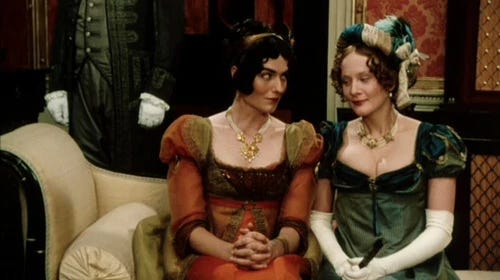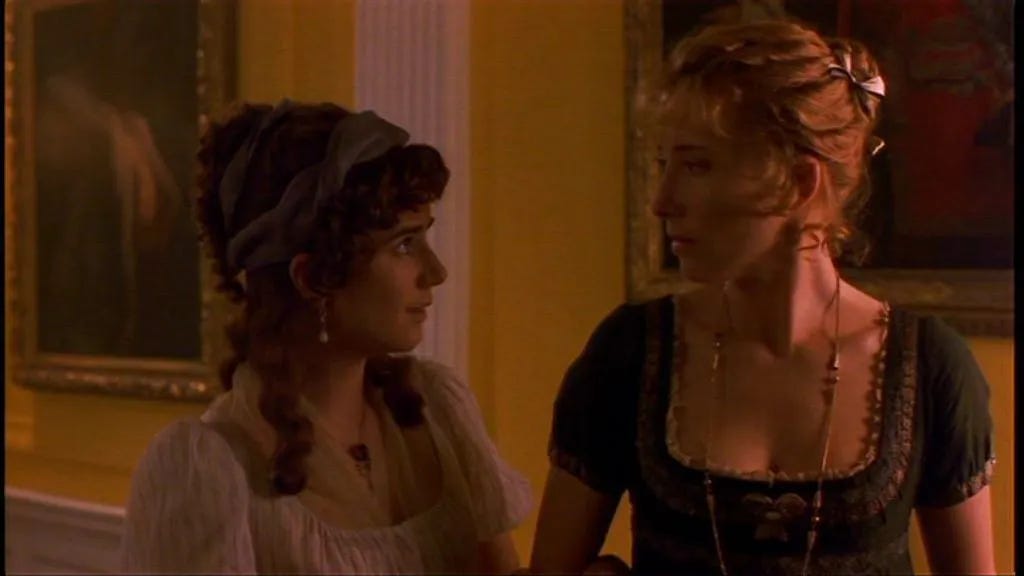Modern Austen's Guide to Fake Friends
Beware these deceitful characters when forming new friendships!
Let’s talk about female friendship: It’s great, & you should seek it out! But beware, modern heroines, that finding true friends isn’t always straightforward. There are some deceitful characters who would pretend to be your friend just to get what they want, flatter their vanity, or even see you fail.
Don’t despair: True friendship exists. But you need to learn to see through the charming & polite facade of what I call fake friends & avoid them at all costs.
Here are 5 types of fake friends & how to spot them.
The gold-digging friend
If there’s the slightest chance you could be mistaken for an heiress & your gullible older brother is a bachelor, then be wary of the gold-digging friend trying to secure you in her clutches. She might want to spend every moment in your company accusing every man she encounters of trying to flirt with her, but she’s really only interested in your rumored fortune.
Take Isabella Thorpe in Northanger Abbey. She doesn’t really want to be friends with Catherine Morland. To her, Catherine is only a means to secure a proposal from James Morland, & a rich bride for her brother John Thorpe.
Catherine’s too naive to see through Isabella’s pathetic attempts at friendship. And despite witnessing Isabella flirting with other men after becoming engaged to Mr. James Morland, Catherine is still shocked when the true character of Miss Thorpe is finally revealed.
Poor Catherine Morland was taken in by a gold-digging friend. Don’t be like Catherine.
The insincere friend
There’s really nothing worse than discovering that the man you love, & who you’re pretty sure loves you back, has been secretly engaged to another woman for 4 years. Well, hearing about it from the fiancé—your insincere friend—is probably worse.
The insincere friend, like Lucy Steele in Sense & Sensibility, will relay this information to you sweetly, of course, because she sees you as a sensible person whom she can confide in. But make no mistake that an insincere friend’s only intention of telling you that she’s secretly engaged to Edward Ferrars is to break your heart.
An insincere friend like Miss Steele knows that the man she’s engaged to is actually in love with you, & she’ll pretend to be your bestie only to convince you that Edward has only ever loved you like a sister. That’s the last thing any woman wants to hear about the man she loves!
While Elinor isn’t enamored with her new & insincere friend—”she could have no lasting satisfaction in the company of a person who joined insincerity with ignorance”—she claims she has no reason to doubt Lucy’s story.
Don’t be like Elinor. Remember: If someone is eager to share intimate details about her life when you haven’t been long-acquainted, she’s most likely trying to deceive you.
Have a question for Modern Austen? Send your letters to modernaustenblog@gmail.com.
The belittling friend
There’s probably no greater master of the backhanded compliment than Caroline Bingley. It’s amazing how she can sound so friendly while making crude remarks to Lizzie & Jane about their family.
Jane, for most of Pride and Prejudice, doesn’t notice the venom in Caroline’s words & believes that the Bingley sisters want to be her friend because of Mr. Bingley’s affection for her. But Lizzie always feels the sting of Caroline’s good-natured comments, & Miss Bingley knows it. She wants to get a rise out of Lizzie, especially when they’re in Mr. Darcy’s presence.
Your heart sort of has to go out to Miss Bingley. All she wants is to become Mrs. Darcy, but Elizabeth Bennet comes along & spoils everything.
Lizzie shows us exactly how to behave when faced with a belittling friend: Take her shit with as much grace as you can muster. She’ll be furious that she can’t get you to stoop to her level. And it will make your own Darcy fall even more in love with you.
In short: Be like Lizzie, never like Jane.
The delusional, social-climbing friend
You’ll get annoyed with this friend real fast.
Since she has a sister who recently married into money, she thinks her opinion of you & your friends is the only one that matters. She’ll even tell you that she’s surprised to find that your dearest friend, who isn’t exactly your equal in social status, has such refined manners.
Lord, the way this woman carries on about her sister’s barouche coach & how the 2 of you should start a music club will make you wish you weren’t the richest woman in Highbury—then this vulgar little upstart would have no interest in getting to know you.
With a delusional, social-climbing friend, it’s best to play into her delusion. Politely snub her when possible, but be careful not to upstage her. That’s the mistake Emma makes.
Don’t be like Emma. Having a delusional social climber as your enemy is the last thing you need.
The vain but well-meaning friend
Poor Harriet Smith couldn’t see that she was only a pet project for Emma Woodhouse. She must have had some sense that she could never be Miss Woodhouse’s equal, but Emma was just so nice to her!
Emma convinced Harriet that Robert Martin wouldn’t make a suitable husband. She even persuaded her to fall in love with Mr. Elton, and we all know how that turned out.
Rich bitches like Emma will deceive themselves into thinking that they have good intentions for forming friendships that are beneath them, but the truth is that their vanity just won’t allow them to hang out with women who are their equals (like Jane Fairfax). Emma would much rather remake Harriet Smith in her own image.
Don’t be Harriet. Just be wary of rich people, OK? No good can come of their good intentions.









